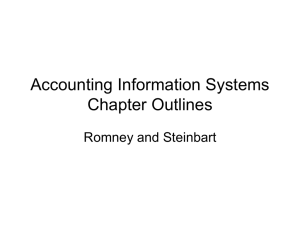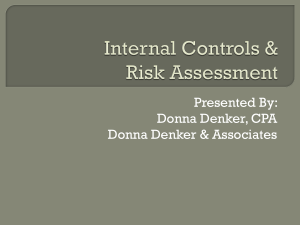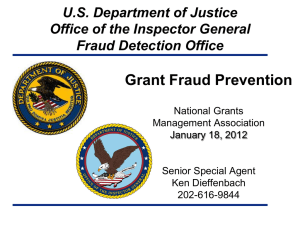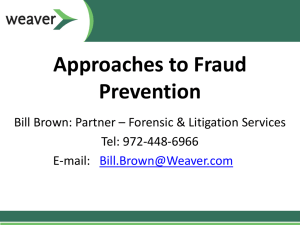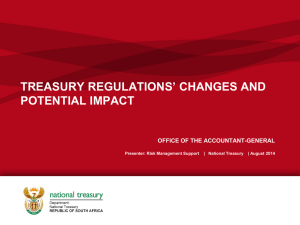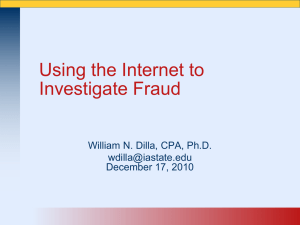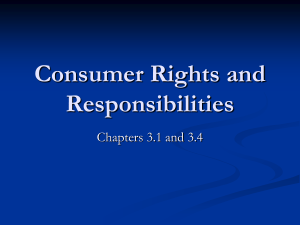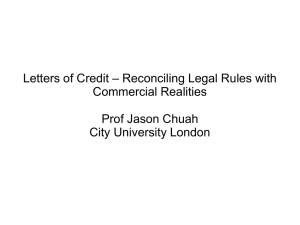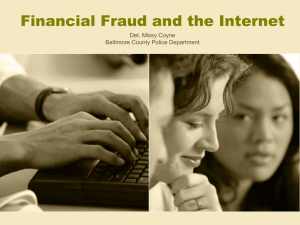Differences between public auditors and forensic accountants in
advertisement
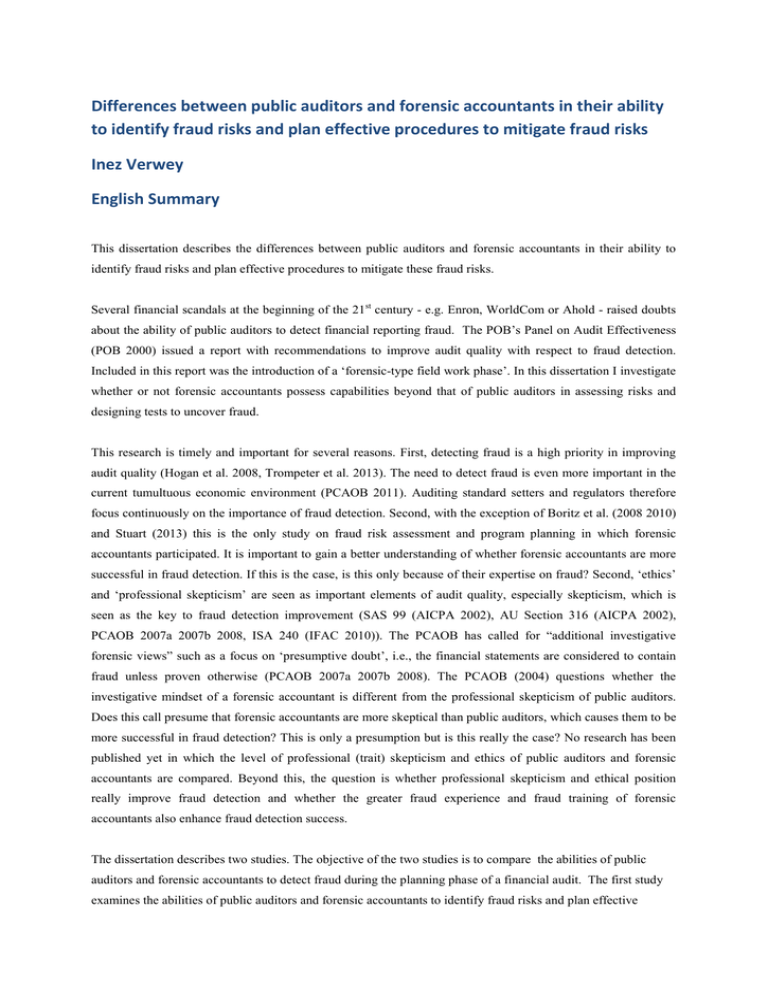
Differences between public auditors and forensic accountants in their ability to identify fraud risks and plan effective procedures to mitigate fraud risks Inez Verwey English Summary This dissertation describes the differences between public auditors and forensic accountants in their ability to identify fraud risks and plan effective procedures to mitigate these fraud risks. Several financial scandals at the beginning of the 21st century - e.g. Enron, WorldCom or Ahold - raised doubts about the ability of public auditors to detect financial reporting fraud. The POB’s Panel on Audit Effectiveness (POB 2000) issued a report with recommendations to improve audit quality with respect to fraud detection. Included in this report was the introduction of a ‘forensic-type field work phase’. In this dissertation I investigate whether or not forensic accountants possess capabilities beyond that of public auditors in assessing risks and designing tests to uncover fraud. This research is timely and important for several reasons. First, detecting fraud is a high priority in improving audit quality (Hogan et al. 2008, Trompeter et al. 2013). The need to detect fraud is even more important in the current tumultuous economic environment (PCAOB 2011). Auditing standard setters and regulators therefore focus continuously on the importance of fraud detection. Second, with the exception of Boritz et al. (2008 2010) and Stuart (2013) this is the only study on fraud risk assessment and program planning in which forensic accountants participated. It is important to gain a better understanding of whether forensic accountants are more successful in fraud detection. If this is the case, is this only because of their expertise on fraud? Second, ‘ethics’ and ‘professional skepticism’ are seen as important elements of audit quality, especially skepticism, which is seen as the key to fraud detection improvement (SAS 99 (AICPA 2002), AU Section 316 (AICPA 2002), PCAOB 2007a 2007b 2008, ISA 240 (IFAC 2010)). The PCAOB has called for “additional investigative forensic views” such as a focus on ‘presumptive doubt’, i.e., the financial statements are considered to contain fraud unless proven otherwise (PCAOB 2007a 2007b 2008). The PCAOB (2004) questions whether the investigative mindset of a forensic accountant is different from the professional skepticism of public auditors. Does this call presume that forensic accountants are more skeptical than public auditors, which causes them to be more successful in fraud detection? This is only a presumption but is this really the case? No research has been published yet in which the level of professional (trait) skepticism and ethics of public auditors and forensic accountants are compared. Beyond this, the question is whether professional skepticism and ethical position really improve fraud detection and whether the greater fraud experience and fraud training of forensic accountants also enhance fraud detection success. The dissertation describes two studies. The objective of the two studies is to compare the abilities of public auditors and forensic accountants to detect fraud during the planning phase of a financial audit. The first study examines the abilities of public auditors and forensic accountants to identify fraud risks and plan effective procedures to mitigate identified fraud risks. In a between-subjects experiment 48 Dutch forensic accountants and 131 Dutch public auditors were asked to identify fraud risks, assess the fraud risk and plan audit procedures to detect the identified risks. The case used in this study is based on a SEC enforcement fraud action and adopted from Asare & Wright (2004). In the second study I combined the results of the first study with data about personal characteristics of the participants: level of professional skepticism, ethical position, and experience with fraud and fraud training. The differences between public auditors and forensic accountants as found in the first study can only partially be explained by differences in ethical position, professional skepticism, and fraud experience and fraud training. For public auditors a lower level of ethical relativism 1 and a higher level of professional skepticism result in more effective audit procedures. An interesting finding is that fraud experience appears to negatively influence the planning of audit procedures. For forensic accountants a higher level of professional skepticism results in identifying more fraud risks and more fraud training results in planning more effective audit procedures. The research results of the first study indicate that forensic accountants identify more fraud risks than public auditors. Forensic accountants also planned marginally significantly more effective audit procedures to mitigate those fraud risks. These results support the assumption that consultation with forensic accountants is likely to enhance the planning phase of an audit engagement to detect fraud. Public auditors who experienced time budget pressure planned less effective procedures than those who did not experience time budget pressure. Time budget pressure appeared to have no significant effect on the number of planned effective procedures for forensic accountants as hypothesized. The research results of the second study show that different path models appear for public auditors and forensic accountants. This finding means that both groups differ significantly with respect to the effect of the independent variables on the fraud detection tasks studied, and could therefore be considered to be heterogeneous groups as hypothesized. For public auditors a lower level of ethical relativism (a specific element of ‘ethical position’) and a higher level of professional skepticism result in more effective audit procedures. An interesting finding is that fraud experience appears to have no influence on the planning of audit procedures. For forensic accountants a higher level of professional skepticism results in identifying more fraud risks and more fraud training results in planning more effective audit procedures. No other significant relations between the research variables are found. These findings suggest that the differences between public auditors and forensic accountants in identifying fraud risks and planning effective procedures as found in the first study can only partially be explained by differences in ethical position, professional skepticism, and fraud experience and fraud training. All variables play a role, but they do not explain the differences in fraud risk detection and planning. The findings of the second study suggest some interesting patterns that need further corroboration and consideration. For instance, the analyses suggest that fraud experience appears to have no or a negative influence (depending on which scale to measure the variable ‘fraud experience’) on the ability to plan effective audit procedures for public auditors. The suggested negative influence of ‘fraud experience’ on the ability to plan effective audit procedures might be explained by the fact that ‘fraud experience’ leads to a misplaced narrow focus. As fraud cases are rare during the career of public auditors, a single fraud experience may lead to the situation that the auditor unjustly thinks he recognizes the same fraud case. The auditor then projects his specific experience on a new situation and focuses on procedures to detect this fraud as used in the earlier experience. So the risk of misrecognition of fraud risks may lead to a loss of audit quality instead of improvement. The analyses show that the definition and the scales to measure the variables ‘fraud experience ‘ and ‘fraud training’ have to be very specific. Both variables differ between public auditors and forensic accountants significantly. To compare these variables between both groups of participants in one study is very difficult. For forensic accountants a higher level of professional skepticism has a positive effect on the ability to identify fraud risks. For public auditors ‘fraud training’ appears to have a positive influence on the ability to plan effective audit procedures Another interesting finding is that for both groups of participants there is no relation between the ability to identify fraud risks and the ability to plan effective audit plan procedures. Public auditors – as well as forensic accountants – seem to consider both tasks to be separate during an audit engagement. They do not consistently react to risk factors but tend to rely on a standard audit plan (Trompeter et al. 2013). Whether this is a result of a lack of ability to respond to fraud risks is unclear (Patterson & Noel 2003, Trompeter et al. 2013). The public auditor has to develop an overall view of an audit engagement, rather than focusing on finishing and reporting separated tasks. The integration of the tasks will improve audit quality as planning procedures that are effective to detect fraud is only possible when they are focused on the specific fraud risks identified. This second study of this dissertation indicates that other variables than professional skepticism, ethical position, and fraud experience and fraud training may play a role. Audit firms and standard setters should urge auditors to integrate these tasks, as this integration will improve audit quality. Planning effective procedures is only possible when they are focused on the specific fraud risks identified. Overall, the two studies described in this dissertation are first steps in a new research direction of fraud detection by public auditors. Focusing on differences in characteristics and task experience and training between public auditors and forensic accountants provide an opportunity to gain a better understanding of the difficulties public auditors have with respect to detect fraud. I hope these two studies, as described in this dissertation, will stimulate future research on audit quality into revealing the fraud detection abilities of forensic accountants and use that knowledge to improve audit quality by public auditors. Forensic accountants can add value during an audit engagement with respect to fraud detection. Additional investigation into why they are successful in fraud detection, future research that focuses on differences in personal characteristics – e.g. analytical skills, forensic skills, investigative mindset – between public auditors and forensic accountants will provide opportunities to improve fraud detection of public auditors. This improvement may include insights on how to train public auditors to detect fraud or have public auditors with certain personal characteristics to assess fraud risks and to plan procedures to mitigate those fraud risks. What training and what personal characteristics this should be, is still to be determined and future research can contribute.
